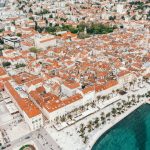The Croatian Prime Minister looks back on his government’s achievements during 2018, and offers and insight into what else will be implemented in 2019, from tax reductions and help with housing costs to demographic measures.
”If, because of the continued issues between Israel and America, the Republic of Croatia is unable buy the F-16 Barak combat aircraft from the Israelis, as it has chosen to, Croatia will cancel its decision,” said Croatian Prime Minister Andrej Plenković in an interview with Vecernji list.
As Poslovni Dnevnik writes on the 31st of December, 2018, in his New Year’s interview with Vecernji list, Croatian Prime Minister Andrej Plenković spoke about the government’s 2019 announcements in the field of tax policy, economy and demography, Croatia’s foreign and EU policy, and relations with neighbouring countries.
When asked if Israel had written approval from America to allow for the sale of F-16 Barak aircraft to Croatia when they showed up at the Croatian tender for the purchase of combat aircraft, Plenković said that “Israel had taken on the obligation of needing to obtain American permission for the sale of the airplanes offered, ie, the F-16 Barak, which Croatia has chosen “.
“At this point, we have information that the US doesn’t agree with the sale of Israel’s airplanes [which have been] offered to Croatia and insists that all the equipment with which the Israeli aircraft has been upgraded and modified be removed from them. We expect an Israeli declaration in view of these new circumstances,” the Croatian Prime Minister stated.
“As I said publicly three weeks ago, if we were unable to buy the airplanes we selected, the government will cancel its decision on the choice,” he noted.
Regarding a recent decision by the President of the Republic of Croatia to dismiss her adviser Mato Radeljić, the Croatian Prime Minister recalled the fact that there were a number of advisors who had also been dismissed, adding that he was talking about staffing issues under the authority of the Croatian president.
Commenting on Radeljić’s allegations of alleged threats made to him from SOA, Plenković said that SOA had carried out internal controls and no pressure or threats of any kind had been found.
“I spoke with SOA’s chief, he reported to me that SOA carried out its internal oversight of this issue, and even the slightest doubt that pressures or threats were being made to the former advisor were completely eliminated,” he added.
When asked about the now somewhat infamous SMS affair, the Croatian Prime Minister emphasised that this affair was particularly bad because it regarded absolutely unacceptable behavior.
”Fabrication, ie, the counterfeiting of alleged correspondence of the highest political and judicial officials, was aimed at destabilising the political scene, the institution and the legal order. We want to strengthen trust in our institutions, I expect the police, DORH and all the competent bodies to keep shedding light on this affair right up until the end,” he said.
Regarding the government’s implemented tax reforms, the Croatian Prime Minister said that his government is continuing to reduce taxes, including VAT rates, as it committed to earlier in its program.
“Our tax system is now simpler and fairer than it was at the beginning of this mandate, with a total tax deduction for citizens and entrepreneurs of 6.5 billion kuna,” Plenković said, adding that tax on medicine will drop as of the 1st of January, 2019.
”We’ve seen that shops have already started lowering their prices, which hasn’t been the case so far, and this way it [the tax reductions] will be felt by citizens,” he added.
Asked if he has now completely dropped the controversial idea of property tax, the Croatian Prime Minister simply said, “There will be no property tax.”
Reflecting on the demographic measures implemented by his government so far, Plenković emphasised the fact that he believes that positive demographic figures are also showing that, over the first ten months of 2018, 351 children more were born than during the same period last year, and that this is a direct result of the Croatian Government’s various demographic measures.
“When we keep in mind that this number has continued to decline over the last twenty years, and in 2017, 981 less children were born than there were one year earlier, this latest data provides moderate optimism,” he said.
“We’re subsidise housing loans for young people, thanks to which 5,200 families now have their homes. In the next two years, another 5 or 6 thousand families can expect to be helped to build or purchase a house or apartment,” the Croatian Prime Minister added.
In addition, he said, tax reforms had strong positive demographic effects on the country.
Make sure to stay up to date with our dedicated politics page for much more.








